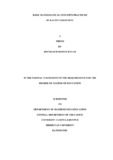Please use this identifier to cite or link to this item:
https://elibrary.tucl.edu.np/handle/123456789/1717| Title: | Basic Mathematical Concepts Practiced by Raute Community |
| Authors: | Bayak, Jhankar Bahadur |
| Keywords: | Study;Concepts;Community |
| Issue Date: | 2019 |
| Publisher: | Central Department of Education Mathematics |
| Abstract: | This study entitled with "Basic Mathematical Concept Practiced by Raute Community." The main objectivities of this study were to explore the indigenous knowledge, activities and objects that are relevant to mathematical concepts. I selected the qualitative research design with ethnography approach. This study was carried out in Gurause municipality- 05 of Dailekha district. Purposive sampling technique was use to select the participants. Eight Raute community people were the sample of this study. I had taken one month for the data collection in the related fields. Participant observation, interview guidelines and photographs were the main tools for this study. The collected data were analysis with the help of different theories. Then it was found that Raute people don't have their own script but have their own language. Raute people have their own name for counting number. Some Raute people used formal way of addition and subtraction but rest were using alternate ways. Raute people solve their addition subtraction multiplication and division. The volume is measured with different types of pots. The units of volume are mutthi, mana, kuruwa, pathi and muri, geometrical objects that they mostly prefer to construct such as: Katiya, Madhus, Koshi, Para Chakla etc. by the shape of various like circle, conical, circular, rectangle, ellipse and rhombus in Raute community. So, it is concluded that this types of ethno-mathematical practices. |
| URI: | http://elibrary.tucl.edu.np/handle/123456789/1717 |
| Appears in Collections: | English Language Education |
Files in This Item:
| File | Description | Size | Format | |
|---|---|---|---|---|
| Cover Page(5).pdf | 28.08 kB | Adobe PDF |  View/Open | |
| Chapter Page(2).pdf | 259.02 kB | Adobe PDF |  View/Open |
Items in DSpace are protected by copyright, with all rights reserved, unless otherwise indicated.
